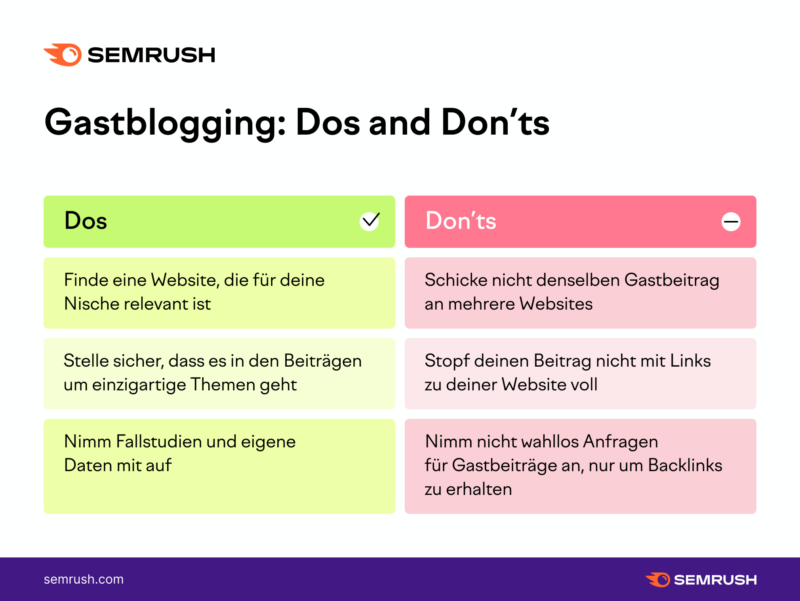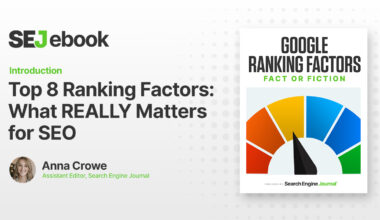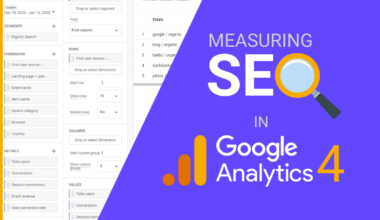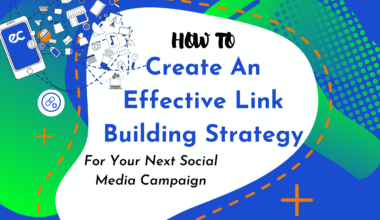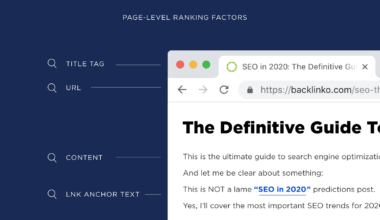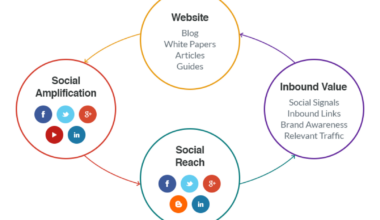Introduction to Link Building for SEO
As a website owner, I’m sure you want your website to rank higher in search engines. One of the most effective ways to do this is through link building. Link building is the process of getting other websites to link back to your website. In this article, we will discuss the dos and don’ts of link building for SEO.
Link building is an important aspect of SEO because search engines use links to determine the authority and relevance of a website. The more quality backlinks a website has, the higher it will rank in search engine results pages (SERPs).
However, not all links are created equal. Search engines prioritize quality over quantity when it comes to backlinks. Quality backlinks are links from authoritative websites that are relevant to your website’s content. On the other hand, low-quality backlinks are links from spammy or irrelevant websites.
In order to improve your website’s search engine rankings through link building, it is important to follow the dos and don’ts of link building. These guidelines will help you avoid common mistakes and ensure that your link building efforts are effective.
In the next sections, we will discuss the dos and don’ts of link building for SEO, common mistakes to avoid, and the future of link building for SEO. By following these guidelines, you can improve your website’s search engine rankings and attract more traffic to your website.
Understanding the Importance of Quality Backlinks
As mentioned earlier, quality backlinks are essential for improving your website’s search engine rankings. Let’s dive deeper into why quality backlinks are so important.
Firstly, quality backlinks signal to search engines that your website is a reliable and trustworthy source of information. When other authoritative websites link back to your website, search engines view it as an endorsement of your content’s quality and relevance. This, in turn, can help boost your website’s search engine rankings.
Secondly, quality backlinks also increase your website’s visibility and exposure. When your website is linked to from other authoritative websites, it exposes your content to a new audience, which can lead to increased traffic and engagement.
However, it’s important to note that not all backlinks are created equal. Search engines prioritize quality over quantity when it comes to backlinks. In fact, low-quality backlinks from spammy or irrelevant websites can actually harm your website’s search engine rankings.
So, how do you build quality backlinks? One effective way is to create high-quality content that people naturally want to link to and share. This can include informative blog posts, infographics, videos, and other types of content that provide value to your target audience.
Another way to build quality backlinks is through outreach. This involves reaching out to other websites in your industry and asking them to link back to your content. However, it’s important to approach this method with caution and avoid spammy tactics. Instead, focus on building genuine relationships with other website owners and providing value to their audience.
In conclusion, quality backlinks are a crucial aspect of SEO that can help improve your website’s search engine rankings and increase your visibility and exposure. By following the dos and don’ts of link building and focusing on building high-quality backlinks, you can improve your website’s performance and attract more traffic to your website.
Dos of Link Building for SEO
Link building can be a daunting task, but by following the dos of link building for SEO, you can make the task easier and more effective. Here are some dos of link building for SEO:
1. Focus on Quality over Quantity:
As mentioned earlier, quality backlinks are more important than the number of backlinks. Focus on building links from authoritative websites that are relevant to your content. This will help improve your website’s search engine rankings and attract more traffic to your website.
2. Create High-Quality Content:
Creating high-quality content is a great way to attract natural backlinks. When you create valuable content that provides value to your target audience, other websites are more likely to link back to your content. So, focus on creating informative blog posts, infographics, videos, and other types of content that provide value to your target audience.
3. Use Social Media:
Social media is a great way to promote your content and attract backlinks. By sharing your content on social media platforms like Twitter, Facebook, and LinkedIn, you can attract more traffic to your website and increase the visibility of your content.
4. Conduct Outreach:
Conducting outreach is a great way to build relationships with other website owners and attract backlinks. When you reach out to other website owners in your industry, you can ask them to link back to your content. However, it’s important to approach this method with caution and avoid spammy tactics.
5. Use Internal Linking:
Internal linking is a great way to improve your website’s search engine rankings and attract more traffic to your website. By linking to other pages on your website, you can improve the user experience and help search engines understand the structure of your website.
In conclusion, link building is an essential aspect of SEO that can help improve your website’s search engine rankings and attract more traffic to your website. By following the dos of link building for SEO, you can make the task easier and more effective.
Don’ts of Link Building for SEO
While there are many dos of link building for SEO, there are also several don’ts that you should avoid. These common mistakes can harm your website’s search engine rankings and reputation. Here are some don’ts of link building for SEO:
1. Don’t Buy Links:
Buying links is a violation of Google’s Webmaster Guidelines and can lead to severe penalties. While it may be tempting to purchase links to boost your website’s search engine rankings quickly, it’s not a sustainable or ethical strategy. Instead, focus on building natural backlinks through high-quality content and outreach.
2. Don’t Use Automated Link Building Tools:
Automated link building tools can create low-quality backlinks that can harm your website’s search engine rankings. These tools often use spammy tactics to build backlinks quickly, which can lead to penalties from search engines. Instead, focus on building natural backlinks through high-quality content and outreach.
3. Don’t Use Keyword-Rich Anchor Text:
Keyword-rich anchor text is when you use a keyword as the clickable text for a backlink. While this was once an effective strategy for improving search engine rankings, it’s now considered a spammy tactic that can harm your website’s search engine rankings. Instead, use natural anchor text that accurately describes the content of the linked page.
4. Don’t Focus on Link Quantity Over Quality:
While it’s important to build backlinks to your website, it’s more important to focus on quality over quantity. Low-quality backlinks from spammy or irrelevant websites can harm your website’s search engine rankings and reputation. Instead, focus on building high-quality backlinks from authoritative websites that are relevant to your content.
5. Don’t Use Private Blog Networks (PBNs):
Private blog networks (PBNs) are a network of low-quality websites that are used to build links to a primary website. While this was once an effective strategy for improving search engine rankings, it’s now considered a spammy tactic that can lead to severe penalties from search engines. Instead, focus on building natural backlinks through high-quality content and outreach.
In conclusion, link building for SEO requires a strategic and ethical approach. By avoiding these common mistakes and focusing on building high-quality backlinks through high-quality content and outreach, you can improve your website’s search engine rankings and reputation. Remember, quality always trumps quantity when it comes to link building.
Common Link Building Mistakes to Avoid
Link building is a crucial aspect of SEO, but it’s important to avoid common mistakes that can harm your website’s search engine rankings. Here are some common link building mistakes to avoid:
1. Ignoring Relevance:
When building backlinks, it’s important to focus on relevance. Backlinks from irrelevant websites can harm your website’s search engine rankings. For example, if you run a website that sells shoes, getting a backlink from a website that sells pet food is not relevant and can harm your website’s SEO. Instead, focus on building backlinks from websites that are relevant to your content.
2. Not Diversifying Your Backlink Portfolio:
Diversifying your backlink portfolio is important for improving your website’s search engine rankings. If all of your backlinks come from a single source, it can harm your website’s SEO. Instead, focus on building backlinks from a variety of sources, including authoritative websites, social media platforms, and blogs.
3. Not Checking for Broken Links:
Broken links can harm your website’s SEO, so it’s important to check for broken links regularly. If you have backlinks from websites that have broken links, it can harm your website’s search engine rankings. Use a tool like
Dead Link Checker
to check for broken links and fix them.
4. Using Low-Quality Directories:
While directories can be a good source of backlinks, it’s important to avoid low-quality directories. Backlinks from low-quality directories can harm your website’s search engine rankings. Instead, focus on building backlinks from high-quality directories that are relevant to your content.
5. Not Using Anchor Text Effectively:
Anchor text is important for SEO, but it’s important to use it effectively. Using the same anchor text repeatedly can harm your website’s search engine rankings. Instead, use natural anchor text that accurately describes the content of the linked page.
In conclusion, link building is an important aspect of SEO, but it’s important to avoid common mistakes that can harm your website’s search engine rankings. By focusing on relevance, diversifying your backlink portfolio, checking for broken links, using high-quality directories, and using anchor text effectively, you can improve your website’s search engine rankings and attract more traffic to your website.
Final Thought: The Future of Link Building for SEO
As search engine algorithms continue to evolve, the future of link building for SEO is becoming more complex. While link building will still be an important aspect of SEO, the way we approach link building will change. Here are some trends that we can expect to see in the future of link building for SEO:
1. Focus on E-A-T:
E-A-T stands for Expertise, Authoritativeness, and Trustworthiness. Google has made it clear that E-A-T is an important factor in determining search engine rankings. In the future, we can expect to see a greater focus on building backlinks from websites that have high levels of E-A-T.
2. Greater Emphasis on Relevance:
As search engines become more sophisticated, we can expect to see a greater emphasis on relevance when it comes to link building. Backlinks from irrelevant websites will become less valuable, and backlinks from websites that are highly relevant to your content will become more valuable.
3. More Emphasis on User Experience:
User experience will become an increasingly important factor in determining search engine rankings. Websites that provide a positive user experience will be rewarded with higher search engine rankings. This means that link building will need to focus on building backlinks from websites that provide a positive user experience.
4. Greater Use of Artificial Intelligence:
Artificial intelligence is becoming more sophisticated, and we can expect to see greater use of AI in link building. AI can help identify high-quality websites to target for link building and can help identify low-quality backlinks that need to be removed.
In conclusion, the future of link building for SEO is becoming more complex, but by focusing on E-A-T, relevance, user experience, and AI, we can continue to improve our website’s search engine rankings and attract more traffic to our website. It’s important to stay up-to-date with the latest trends and best practices in link building to ensure that our efforts are effective and ethical.
